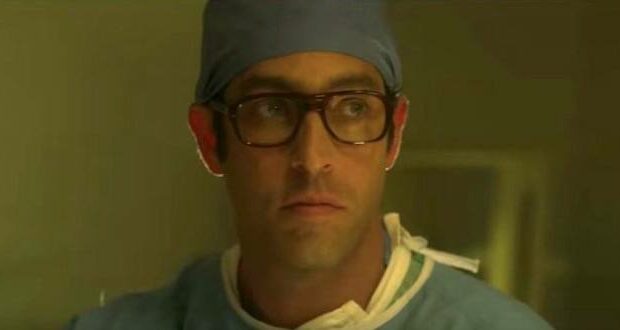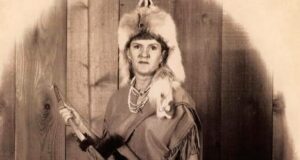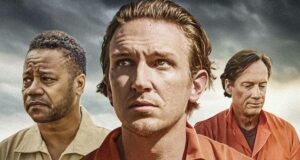The film Roe v. Wade tells the story of what many consider one of the most important cases in Supreme Court history. It’s a tale told from an insider’s dramatized perspective, that of Dr. Bernard Nathanson, a New York physician at the heart of this complex and multilayered story.
On Jan. 22, 1973, nine Supreme Court justices made abortion the law of the land in America. But the film doesn’t begin there. That ruling was the culmination of a cultural struggle years in the making
The film is unique in that Bernie (as his friends call him) narrates each twist and turn in the path toward Roe v. Wade’s legal outcome … and takes us decades further, too, as he realizes with horror the tragic legacy of his life’s work.
The story begins in 1949, after Bernie’s girlfriend confesses that she’s pregnant and wants an abortion. He finds someone willing to perform the procedure. But the blood on her dress when she gets out of the cab afterward tells us it did not go well. Indeed, she soon dies, resulting in Bernie’s multidecade personal crusade to help desperate women obtain safe and legal abortions. “I became a doctor to make sure no girl ever had to go through that again,” he tells us.
By 1970, Bernie has connected with Larry Lader, whom he labels “the father of the abortion movement,” a man personally mentored by Planned Parenthood founder Margaret Sanger. If Bernie’s motivations seem deeply personal, Lader’s seem darker. He’ll stop at nothing to make abortion on demand the law everywhere—and he’s more than willing to reap any financial benefits of the movement.
Lader and Bernie convince emerging feminist icon Betty Freidan to spearhead the cause. Soon, Lader’s “pro-choice” movement fuses with Freidan’s Equal Rights movement to form a potent force bent on granting women the right to abortion in the name of freedom, privacy and equality.
Lader expertly manipulates the media while Bernie pulls made-up statistics out of thin air to support their cause. But what’s truly needed is someone to serve as a pawn in their legal strategy to take their battle to the Supreme Court. With help of two fledgling lawyers in Dallas—Sarah Weddington and Linda Coffee—they find their mark: Norma McCorvey.
She’s perfect, they say: young, inexperienced, a runaway with a criminal record, an alcoholic, a drug addict, a lesbian and a girl with only a 9th-grade education.
In other words, she’s someone they can easily manipulate to accomplish their bigger goal of making abortion legal.
At the heart of this historical story are two interwoven philosophical questions: When does life begin, and does an unborn fetus deserve constitutional protection? We see both sides of this legal, ethical and theological debate play out here.
On the pro-life side, Robert Byrn is an articulate voice challenging anyone who suggests that life doesn’t begin at conception. He’s joined in the movement by the first black, female graduate of Harvard Medical School, Dr. Mildred Jefferson. Father James T. McHugh, a Catholic, also plays a pivotal role in energizing the emerging pro-life coalition.
HOME RELEASE DATE April 2, 2021
DIRECTOR Cathy Allyn, Nick Loeb
DISTRIBUTOR Quiver Distribution
On the other side, Bernie seems to be a sincere believer in his desire to help women (not unlike Abby Johnson in the movie Unplanned). At first, he believes he’s helping those who have “nowhere else to turn.” As the story unfolds, however, Bernie begins to have doubts about what he’s doing—doubts that come crashing down on him when ultrasound technology enables him to see clearly what he’s been doing for so many years. “It’s a person!” he cries, hands covered with blood mid-procedure, as he falls to the floor in tears.
Years later, he tells a Washington Post reporter that some part of him always knew that he had been embracing a lie, but it took literally seeing an abortion’s horror through the lens of an ultrasound machine to make him see the truth.
The Supreme Court justices themselves aren’t depicted in a flattering light. Chief Justice Warren Berger initially stands against Roe, but later flips to the other side of the argument. In the end, newly named Justice Byron White is the one of only two justices to vote against Roe. And we hear his strong, consistent opposition to abortion most clearly.
The film clearly engages us to ask the questions: “How does culture change over time?” and “What influences its currents of conviction to flow this way, or that?” ‘Roe v. Wade’ is getting some fair press, too, with NBC News writing, “New ‘Roe v Wade’ movie isn’t the propaganda piece critics allege.”
We may think of cultural change as a vague, ephemeral thing that simply happens mysteriously in the swirling ether of society. But what Roe v. Wade reminds us is that such currents of change have a source. They flow from individuals and their commitment to ideas and ideals, for better or for ill.
In particular, the film shows us how two men—one driven by warped idealism, one propelled by murkier motives—radically impacted American culture with their behind-the-scenes advocacy for abortion. Lader and Nathanson understand how the levers of power work; this story shows us how they unabashedly pulled them, over and over again.
Roe v. Wade is a difficult movie to watch. For those who can absorb some brief horrific scenes this is an important film. Like Unplanned, Roe v. Wade takes what can devolve into an abstract debate and makes the stakes shockingly clear. It also reminds us, through one man’s painful journey, that even if you’ve embraced a lie for much of your life, there’s still time to turn around and make a redemptive influence in the lives of others.
–Adam Holz | Focus on the Family
#abortion #entertainment #prolife #top headlines #Roe v. Wade
 Metro Voice News Celebrating Faith, Family & Community
Metro Voice News Celebrating Faith, Family & Community










